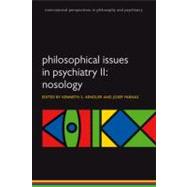
Note: Supplemental materials are not guaranteed with Rental or Used book purchases.
Purchase Benefits
What is included with this book?
| List of Contributors | p. xi |
| Introduction | p. xiii |
| The basics: the definition of psychiatric illness and rules for classification | |
| Introduction | p. 3 |
| Chapter: Classification and causal mechanisms: a deflationary approach to the classification problem | p. 6 |
| Comments: The National Institute of Mental Health Research Domain Criteria (RDoC) project: moving towards a neuroscience-based diagnostic classification in psychiatry | p. 12 |
| Introduction | p. 19 |
| Chapter: Progress and the calibration of scientific constructs: the role of comparative validity | p. 21 |
| Comments: Progress and the calibration of scientific constructs: a new look at validity | p. 35 |
| Introduction | p. 41 |
| Chapter: Taking disease seriously: beyond "pragmatic" nosology | p. 42 |
| Comments: What is psychiatric disease? A commentary on Dr Ghaemi's paper | p. 54 |
| Introduction | p. 59 |
| Chapter: Is psychiatric classification a good thing? | p. 61 |
| Comments: Diagnoses as labels | p. 71 |
| The historical development of modern psychiatric diagnoses | |
| Introduction | p. 75 |
| Chapter: The nosological entity in psychiatry: a historical illusion or a moving target? | p. 77 |
| Comments: The Kraepelinian pipe organ model (for a more dimensional) DSM-5 classification | p. 95 |
| Introduction | p. 99 |
| Chapter: The 19th-century nosology of alienism: history and epistemology | p. 101 |
| Comments: The nature of the psychiatric object and classification | p. 118 |
| Introduction | p. 125 |
| Chapter: The development of DSM-III from a historical/conceptual perspective | p. 127 |
| Comments: Evaluating DSM-III: structure, process and outcomes | p. 141 |
| Introduction | p. 143 |
| Chapter: DSM-IV: context, concepts and controversies | p. 145 |
| Comments: DSM-IV: some critical remarks | p. 161 |
| The problem of validity | |
| Introduction | p. 167 |
| Chapter: A philosophical overview of the problems of validity for psychiatric disorders | p. 169 |
| Comments: Validity, utility and reality: explicating Schaffner's pragmatism | p. 190 |
| Introduction | p. 197 |
| Chapter: Structural validity and the classification of mental disorders | p. 199 |
| Comments: Seeing sense in psychiatric diagnoses | p. 213 |
| Application to major depression and schizophrenia | |
| Introduction | p. 219 |
| Chapter: When does depression become a mental disorder? | p. 221 |
| Comments: A sea of distress | p. 229 |
| Introduction | p. 235 |
| Chapter: DSM-IV and the founding prototype of schizophrenia: are we regressing to a pre-Kraepelinian nosology? | p. 237 |
| Comments: Phenomenology, nosology and prototypes | p. 260 |
| The way(s) forward | |
| Introduction | p. 267 |
| Chapter: Rendering mental disorders intelligible: addressing psychiatry's urgent challenge | p. 269 |
| Comments: A search for coherence | p. 280 |
| Introduction | p. 283 |
| Chapter: Diagnostic threshold considerations for DSM-5 | p. 285 |
| Comments: The tangible burden of mental disorder in the absence of mental disorder categories in nature: some reflections on Regier's contribution | p. 298 |
| Introduction | p. 303 |
| Chapter: Epistemic iteration as a historical model for psychiatric nosology: promises and limitations | p. 305 |
| Comments: Coherentist approaches to scientific progress in psychiatry: comments on Kendler | p. 323 |
| Index | p. 331 |
| Table of Contents provided by Ingram. All Rights Reserved. |
The New copy of this book will include any supplemental materials advertised. Please check the title of the book to determine if it should include any access cards, study guides, lab manuals, CDs, etc.
The Used, Rental and eBook copies of this book are not guaranteed to include any supplemental materials. Typically, only the book itself is included. This is true even if the title states it includes any access cards, study guides, lab manuals, CDs, etc.